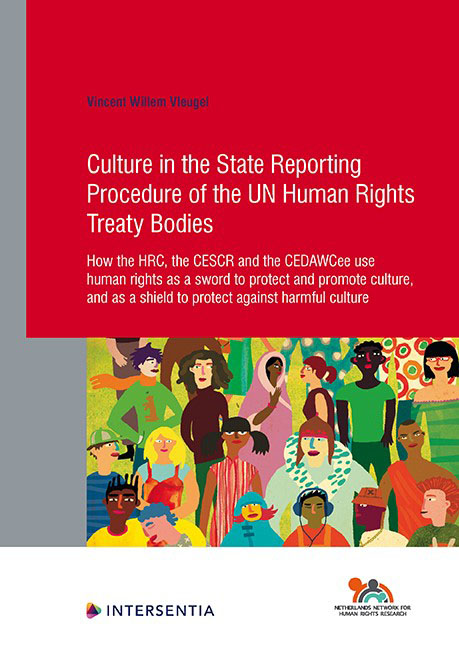 Culture in the State Reporting Procedure of the UN Human Rights Treaty Bodies
Culture in the State Reporting Procedure of the UN Human Rights Treaty Bodies Published online by Cambridge University Press: 11 November 2021
INTRODUCTION
In chapter 2 it was explained that all (of the most authoritative) theories which argue that the dichotomy between universalism and cultural relativism can be overcome build on two principles: (1) flexibility in interpretation and implementation; (2) internal debate and cross-cultural dialogue. The previous chapters discussed whether and how the treaty bodies accommodate cultural diversity by applying the first principle, and showed the different issues and aspects of cultural diversity which feature in the work of the treaty bodies, in particular in the concluding observations and general comments, and how their perceptions of culture and cultural diversity translate into State obligations to change, challenge or eradicate negative aspects of culture. The present chapter examines whether and how the treaty bodies (and States parties) apply the second principle, using the interactive dialogue which is part of the State reporting procedure to create a platform for so-called ‘constructive cross-cultural dialogue’ with a view to reconciling universal rights with cultural differences. It shows that States parties still – and rather frequently – make use of cultural arguments when they interact with the Committees on their progress in the implementation of human rights obligations. It provides insights in the different kinds of cultural arguments provided in front of these Committees, and in the way States parties deal with cultural criticism by the Committees: do they accept the need to change culture, or defend the (room for) culture?
Ultimately, this chapter aims to clarify how, and to what extent, this interaction enables the Committees to challenge cultural norms and practices, and States parties to explain, reiterate or revisit the (value of) particular cultural norms and practices. What are the dynamics around these cultural arguments? It is one thing to give States parties opportunity to explain, excuse or justify a practice or measures based on cultural arguments, but it is another to resolve disagreements in this regard. Committees insist on referring to their interaction with States parties as ‘constructive dialogue’ or ‘interactive dialogue’. This terminology seems to indicate a certain intention (atthe least) to learn from each other, an intention to resolve disagreements and to comecloser to each other.
To save this book to your Kindle, first ensure [email protected] is added to your Approved Personal Document E-mail List under your Personal Document Settings on the Manage Your Content and Devices page of your Amazon account. Then enter the ‘name’ part of your Kindle email address below. Find out more about saving to your Kindle.
Note you can select to save to either the @free.kindle.com or @kindle.com variations. ‘@free.kindle.com’ emails are free but can only be saved to your device when it is connected to wi-fi. ‘@kindle.com’ emails can be delivered even when you are not connected to wi-fi, but note that service fees apply.
Find out more about the Kindle Personal Document Service.
To save content items to your account, please confirm that you agree to abide by our usage policies. If this is the first time you use this feature, you will be asked to authorise Cambridge Core to connect with your account. Find out more about saving content to Dropbox.
To save content items to your account, please confirm that you agree to abide by our usage policies. If this is the first time you use this feature, you will be asked to authorise Cambridge Core to connect with your account. Find out more about saving content to Google Drive.